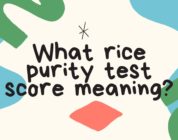A Rice Purity Test score is a number between 0 and 100, which aims to measure the test-taker’s level of ‘purity’ or ‘innocence’ based on their life experiences. A high score suggests a high degree of ‘purity,’ while a low score indicates a broader range of life experiences.
The Rice Purity Test is a series of questions used to determine someone’s level of innocence or purity based on their past experiences and behavior.
The questions touch on a variety of topics, such as sexual activity, drug and alcohol use, and academic honesty. Scores range from 0 to 100, with 100 being the most innocent and 0 being the least.
It is worth noting that the test’s results do not necessarily define someone’s character or value. The questions are subjective and can be interpreted differently by different people based on their personal beliefs, cultural norms, and experiences.
Moreover, the notion of “purity” can be problematic since it implies that a person’s worth is based on their level of innocence or lack of experience. This can be damaging to those who have had experiences that society deems “impure” or “immoral,” causing them to feel ashamed or inadequate.
Therefore, it is essential not to put too much emphasis on the Rice Purity Test score. A high score does not make someone a “better” or “more moral” person than someone with a lower score, nor does a low score make someone “bad” or “immoral.”
It’s important to remember that the Rice Purity Test is not a replacement for professional counseling or medical advice. If someone is experiencing difficulties related to sexual activity, drug or alcohol use, or other behaviors, they should seek assistance from a qualified professional.
To sum up, the Rice Purity Test is a tool used to determine someone’s level of innocence or purity based on their past experiences and behavior. However, the test results do not define a person’s worth or character. It is crucial not to overemphasize the score and to seek help from a professional if needed.




